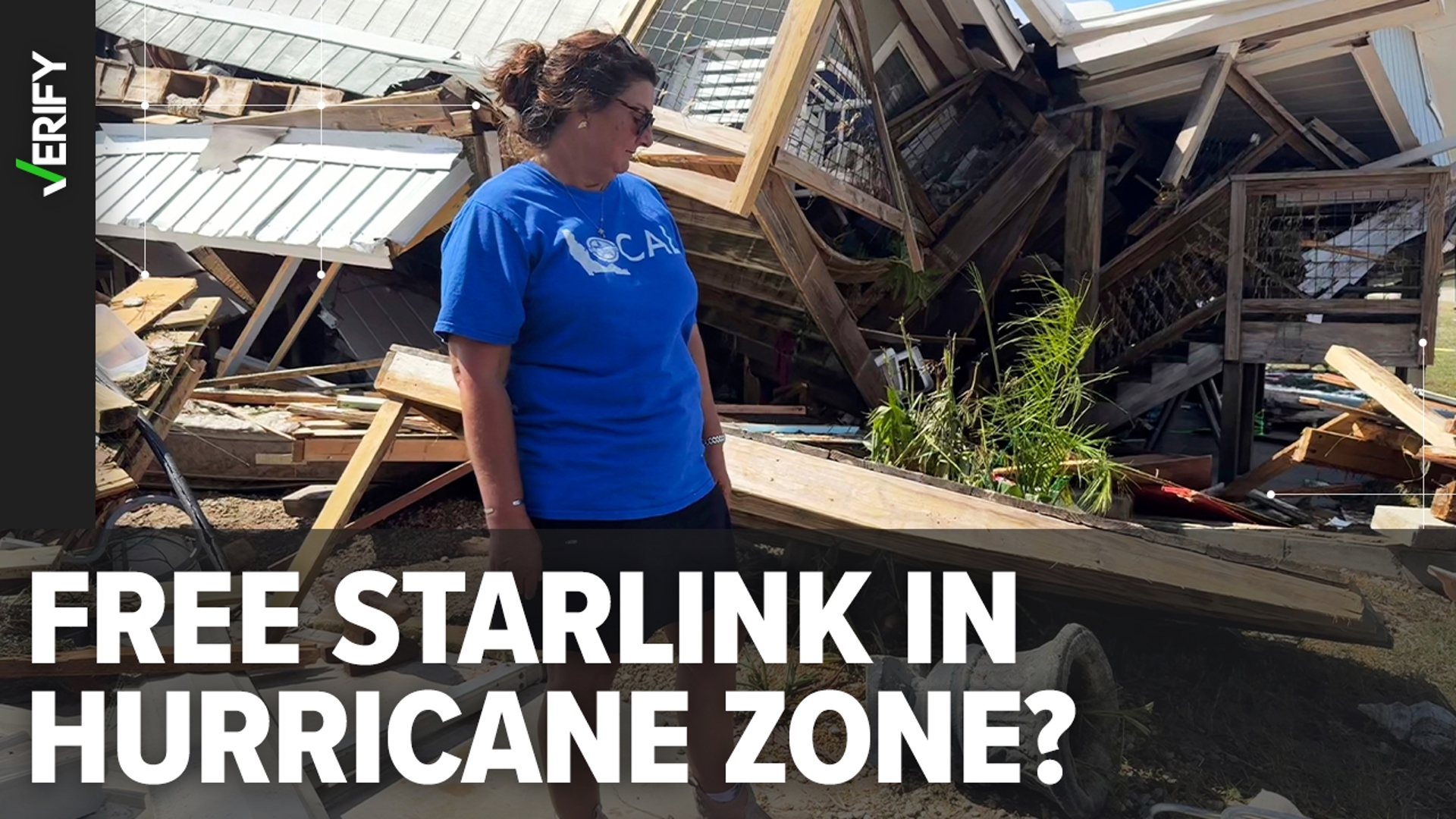Hurricanes Helene and Milton knocked out power, cell towers, and internet access for people from Florida to North Carolina, complicating the already challenging emergency relief and recovery efforts.
Starlink, a subsidiary of Elon Musk’s company SpaceX, appeared to offer a way out: free satellite internet access for a month.
“Areas affected by Hurricane Helene are currently eligible for 30 days of free Starlink service to help with response and recovery effort,” the company posted on X.
But some people claimed the offer was not actually free, and contained hidden costs.
THE QUESTION
Can victims of Hurricanes Helene and Milton get Starlink internet access for free?
THE SOURCES
Reporting by technology publication The Register
THE ANSWER
Starlink internet service will be free to hurricane victims through the end of the year, but accessing that service requires a physical terminal that costs nearly $400.
WHAT WE FOUND
Just like satellite TV requires a dish and cable internet requires a modem, Starlink internet needs a physical terminal to operate.
On Starlink’s webpage about hurricane relief, the company specifies, “A Starlink kit is required to access this free service. If you do not already have a Starlink kit, you will need to purchase one.”
The hardware (which consists of a medium-sized rectangular dish atop a kickstand, along with a router and cables) costs $349, according to the website. That’s in addition to shipping, handling, and taxes – which Starlink priced at an additional $45.83 for an address in Asheville, N.C. Meaning, a hurricane victim in Asheville who does not already own a terminal would need to pay just under $394.83 before they could access the free service.
They could theoretically get the $349 back if they returned the terminal undamaged within 30 days, according to the company’s return policy, though the shipping fees and taxes aren't refundable.
Starlink’s website says once the kit is installed, customers in affected areas will receive free internet service through the end of the year. After that, they will be automatically enrolled in the company’s standard residential internet plan, which costs $120 per month.
Originally the offer was only for 30 days of free service, but on Friday Starlink announced it would be extending the free plans through the end of the year before paid enrollment would begin.
Despite some claims on social media, the paid plan is not a contract, and can be canceled at any time, per the Starlink terms of service.
For those who do already own a terminal, the free period will not come automatically, according to the current instructions on Starlink’s webpage. Users in the qualifying areas can receive “a Hurricane relief credit” off their bill if they file a ticket with customer support, the site says.
Starlink says a typical unit takes three weeks to ship.
Tech news publication The Register reported that the number of people for whom the offer would be useful is relatively small, as the Starlink unit also requires electricity, and it would be unusual for someone to have power restored and be accessible to a delivery vehicle, but still not have internet, in three weeks time.
Starlink is also being used by some first responders, according to FEMA. The agency describes the units as having been purchased by the government, not donated by the company.
Elon Musk has also celebrated another service being offered by Starlink called “direct to cell.” The system aims to eventually be able to provide satellite phone calls, texting, and data coverage by connecting the satellites to cell towers and phones rather than Starlink terminals, but is currently in its early stages and only capable of certain alerts and text messages.
Starlink says right now it is helping to provide emergency alerts to people in the disaster zone. It also says that some texting may be available to T-Mobile customers only, though says “Users may have to manually retry text messages if they don't go through at first, as this is being delivered on a best-effort basis.”
Similar services are offered by non-Starlink satellites and can be accessed by all iPhone users with iOS 18 who cannot access cellular data or Wi-Fi, according to Apple.

